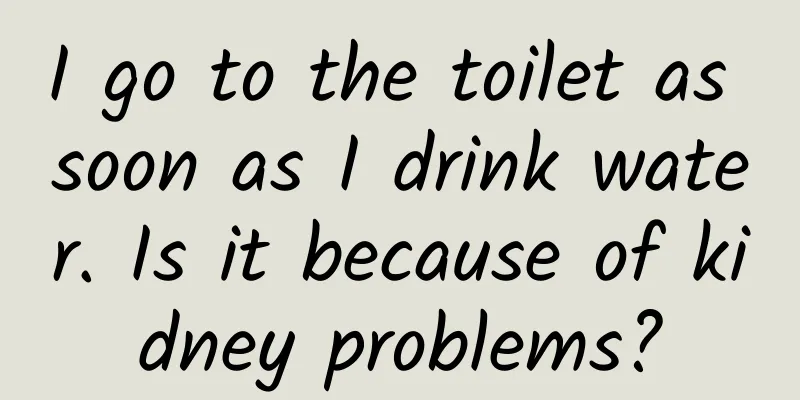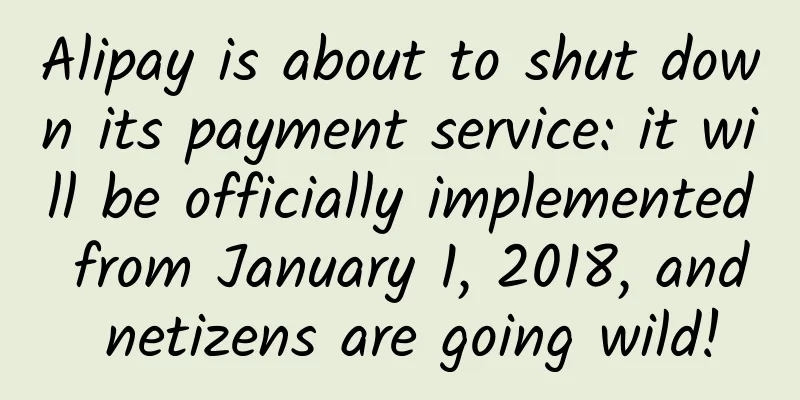I go to the toilet as soon as I drink water. Is it because of kidney problems?

|
Review expert: Cao Qingwei, deputy chief physician of the Urology Department of Shandong Provincial Hospital. Have you ever had this experience: you want to go to the toilet right after drinking water, or even feel the urge to urinate again not long after going to the toilet; before some important exams or interviews, you only drink a sip of water to relieve the dryness of your throat, but when the exam is about to start, you are sweating and want to go to the toilet... When this happens repeatedly, you gradually begin to wonder: I want to go to the toilet as soon as I drink water. Is there something wrong with my kidneys? Today, the editor will reveal the secret - is going to the toilet as soon as I drink water a problem with my kidneys? The process of urine production The production of urine is a long process that involves the coordinated work of multiple organs and systems to ensure the normal functioning of water balance and waste elimination in the body. The water we drink goes from the mouth through the pharynx, throat, and esophagus into the stomach and is temporarily stored. During this process, only a small amount of water is absorbed by the stomach wall and enters the blood circulation; most of the water will enter the small intestine after being stored in the stomach for a period of time and will be absorbed into the blood by the abundant capillaries around the intestinal wall. Source | pixabay After that, the water in the blood circulation is used to maintain and promote various physiological activities and biochemical reactions of the human body. The remaining part enters the kidneys and forms urine through the following processes: 1. Filtration: The first step in urine formation occurs in the glomerulus. The glomerulus is a structure consisting of a network of capillaries and a vascular capsule. As blood passes through the glomerulus, the liquid portion of the blood, salts, and other solutes are filtered out to form primary urine. 2. Reabsorption: The renal tubules are a series of small tubes that run through the nephron. When the primary urine enters the renal tubules, glucose, amino acids and most of the water will be reabsorbed into the blood to maintain the necessary life activities of the human body. 3. Secretion and osmosis: In addition to reabsorption, the renal tubules also secrete substances. Some wastes and solutes, such as uric acid, urea, and drug metabolites, are transported from the blood to the renal tubules for excretion. At the same time, according to the needs of the body, the renal tubules will adjust the osmotic pressure to control the concentration of urine. Diagram of the nephron: 1. Glomerulus, 2. Afferent arteriole, 3. Bowman's capsule, 4. Proximal convoluted tubule, 5. Cortical collecting duct, 6. Distal convoluted tubule, 7. Loop of Henle, 8. Tube of Bellini, 9. Peritubular capillaries, 10. Arcuate vein, 11. Arcuate artery, 12. Afferent arteriole, 13. Proximal glomerulus Source: Wikipedia 4. Final urine: When urine passes through the collecting duct, the cells in these parts will also separate some metabolic waste into the tubules, including ammonia, hydrogen ions, potassium ions, proteins, etc. After being processed by the renal tubules and collecting ducts, the urine formed is the final urine. 5. Urine: The final urine will flow into the ureter and then be stored in the bladder. When the urine reaches a certain volume, the peritoneal nerves will convey the signal of urination and the urine will be discharged from the body. The reason why you go to the toilet after drinking water Since it takes a certain amount of time to form urine, why do you sometimes feel like going to the toilet as soon as you drink water? In fact, this is not necessarily due to kidney problems. Psychological effects Neurogenic polyuria, also known as situational polyuria, is a relatively common psychogenic disease. This condition usually does not involve lesions or damage to the urinary system, but is a physiological response caused by a nervous disorder. The scenario mentioned at the beginning is a typical example of stress-induced frequent urination: when a person faces greater stress or anxiety, their nervous system will be stimulated, causing the urethra muscles to tighten. This will increase the speed at which urine is delivered to the bladder, resulting in frequent urination. In addition, abnormalities in the nervous system or imbalances in nerve regulation may also cause neurogenic urinary frequency. For example, some people may have neurogenic bladder, a condition in which the nerves controlling the bladder are not in control. In this case, the muscles of the bladder are overactive, resulting in an inability to store urine effectively, which leads to frequent urination. Food intake Different water and food intake may affect urination frequency: Drinks with high caffeine content: Caffeine is a diuretic. Drinks such as coffee, tea, and carbonated drinks can stimulate the bladder, increasing urine production and the frequency of urination. Source | pixabay Spicy food: Spicy food may irritate the bladder and cause frequent and urgent urination. Capsaicin in spicy spices such as chili peppers can stimulate nerve endings, causing contractions in the urethra and bladder, leading to frequent urination. Source | pixabay Fruits and vegetables: Certain fruits and vegetables are high in water and fiber, such as watermelon, bitter gourd, etc., which can help promote the formation of urine and increase the frequency of urination. Source | pixabay Salt intake in the diet: Excessive salt intake leads to water and sodium retention. Although you drink a lot of water in the early stage, the amount of urine excreted is not much. After the urinary system gradually metabolizes the salt, the urine volume will gradually increase relatively, so the total urine volume increases, but the amount of urine excreted by each person is relatively fixed, which will lead to an increase in the number of urinations, which will manifest as frequent urination. Of course, everyone's physique is different, and the effect of food and water may be different. Therefore, the specific influencing factors vary from person to person. Why do I drink a lot of water but have no urge to urinate? Excluding disease factors, some people may have naturally larger bladders that can store more urine, and the frequency of urination will be reduced accordingly; some people often hold their urine, and their average limit is 900-1000ml, while the normal limit is 500-800ml. In addition, in the state of extreme dehydration, in order to maintain normal physiological activities of the human body, the renal tubules will absorb a large amount of water, which can also cause the situation of drinking a lot of water but not urinating. In short, there are many reasons why you need to go to the toilet after drinking water, and the situation varies from person to person. But if you suddenly have abnormal urination frequency or urine volume, you must seek medical attention in time! |
<<: Lunar Module: The two richest men in the world compete on the lunar surface
>>: The "Quiet Night Thoughts" you recited was never seen by Li Bai
Recommend
Don't treat "Chinese Valentine's Day" as "Valentine's Day" anymore! I am silent knowing the truth...
In recent years, every Chinese Valentine's Da...
Where is Xixia?
This is a A mysterious, long-neglected dynasty It...
The essence of WeChat public account operation: from original to unique, from low price to priceless
The essence of the value of public accounts . Is i...
Fantasy Westward Journey is so popular, Python is not to be outdone, Python is used to write game auxiliary software!
Fantasy Westward Journey is so popular, Python is...
Mobile phone APPs forged health codes at will, and the police have intervened in the investigation
[[375448]] It has to be said that some people hav...
User operation system for tens of millions of products!
Before we start discussing topics related to &quo...
Shenzhou-17 will carry out the first extravehicular maintenance of a space station in the history of China's space program! How to become a space "maintenance worker"?
On October 26, the Shenzhou 17 manned spacecraft ...
Even with the advent of giant screens, iPhone sales are still soaring
Apple's iPhone sales for the quarter will be m...
China Express has added a new delivery address - space! What is so special about the Tianzhou spacecraft?
Tianzhou spacecraft publicly "collects items...
The Chinese team won 4 gold medals in one hour, and the number of gold medals has exceeded that of the previous Olympic Games!
The Chinese team won 4 gold medals in one hour, a...
What is the origin of the salmonella outbreak caused by chocolate in many countries?
Recently, salmonella outbreaks related to chocola...
Raising Alsophila spinulosa as a potted plant? Beware of life in prison
If you walk into the greenhouse of Wuhan Botanica...
What are the network promotion outsourcing companies in Chengdu?
There are many online marketing companies, but th...
The Secret of Zhongtian Feng Shui PDF, written by Zhang Yonghong, 370 pages, the secrets of Zhongtian Feng Shui, can be downloaded from Baidu Cloud!
The Secret of Zhongtian Feng Shui PDF, written by...
How does BYD make blade batteries charge faster than ternary lithium batteries?
BYD Han's sales in July 2021 reached 8,522 un...









